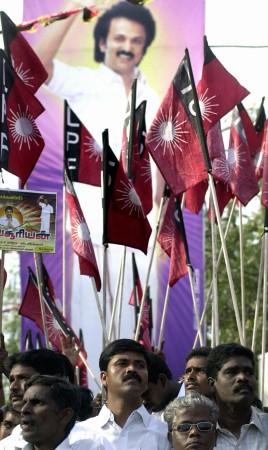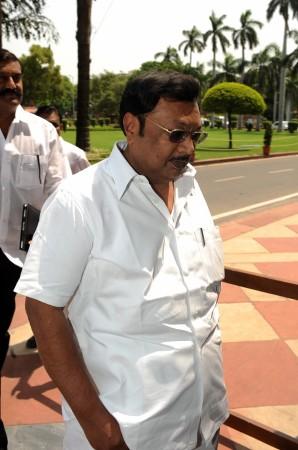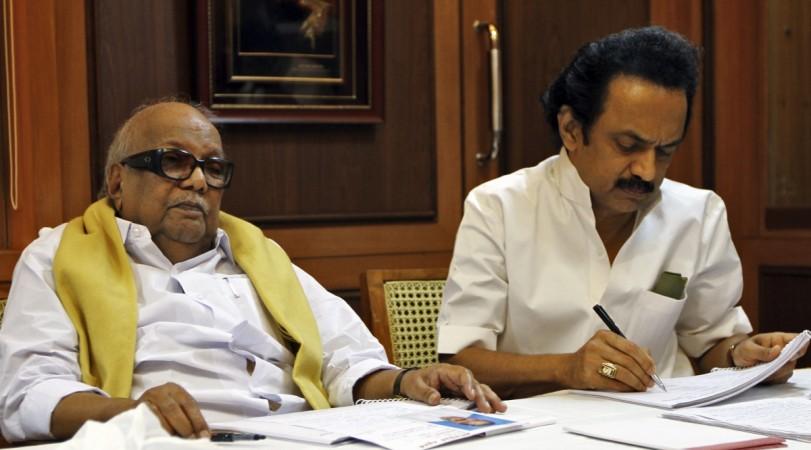
The state of Tamil Nadu and the family of M Karunanidhi are mourning the death of the Dravidian icon, but it will not be long before the lack of a patriarch of Karunanidhi's stature is felt. There are murmurs of the sibling rivalry between MK Alagiri and MK Stalin coming to the fore for control over Dravida Munnetra Kazhagam (DMK).
While one is the older son, the younger one is the popular choice, and neither wants anything to do with the other. Alagiri has been out of the picture since 2014 and Stalin was appointed as the chosen successor for the party by Karunanidhi himself.
The argument of dynastic politics aside, first, let's take a brief look at the two brothers and their roles in the party.
Oldest of the four children from Karunanidhi's second marriage to Dayalu Ammal, and largely missing from Tamil Nadu politics for the most part of the last four decades, Alagiri settled base in Madurai and oversaw the party's functions in the region.

Despite being disapproved by many of the senior DMK leaders, he managed to secure a ticket to the Lok Sabha elections in 2008 and went on to serve as the cabinet minister in the UPA government from 2009 to 2013. Regardless of how small his group of supporters was, Alagiri was still in the picture due to his father's name, until he was excluded from the DMK in January 2014.
Meanwhile, MK Stalin grew into the poster boy of DMK politics. Stalin was groomed for succession by the late Karunanidhi himself, and much like his father, he too entered politics at the tender age of 14 with campaigns. Named after the Soviet dictator, Stalin is known for his calm demeanor as opposed to Alagiri's brazen approach. He was appointed as the party successor by Karunanidhi in 2017.

After serving as the Mayor of Chennai, MK Stalin was elevated to a more prominent position in the state cabinet, having been appointed as the state's first-ever deputy chief minister in 2009, the same year when Alagiri was inducted into the UPA cabinet.
The rivalry between the two brothers is no secret, though Alagiri has visibly been brasher about his opinion of his younger brother. And the fact that Stalin has failed to make a mark on the party's development ever since his appointment as the working president does not help his case either.
However, the public fallout and subsequent clashes between the two brothers do not do wonders for a smooth transition of power in the family. The most infamous incident had to be the attack on Dinakaran, a local daily run by one of the Maran brothers and Karunanidhi's nephew.
The newspaper had published an opinion poll in 2007, according to which 70% of the public favoured Stalin while a mere 2% supported Alagiri. The latter's supporters brazenly attacked the newspaper outlet, resulting in the death of three employees.
The attack had visibly snowballed into a series of disagreements within the Karunanidhi family which had reportedly left Karunanidhi displeased. Coupled with various other controversies surrounding Alagiri, the DMk stalwart eventually decided to expel him from the party.
While there are plenty of reasons to believe Stalin is the better choice, it would mostly be due to the fact that Alagiri seems to have little to no chance of actually grabbing power.
And though many allege Stalin's elevation to the senior-most post in the DMK is purely due to his family, staunch supporters of Karunanidhi stand by his decision and stress that Stalin's growth is due to his own merit.
Some might say Tamil Nadu will flourish only when dynastic politics is out of the picture. But it can also be noted that the two major players in the state politics are AIADMK and DMK - former had the charismatic Jayalalithaa with the support of the Mannargudi mafia, while the latter was led by an established patriarch who apparently blurred the lines between politics and family.
Given the staggering popularity of the two personalities, the people of Tamil Nadu are divided between AIADMK and DMK. And as long as DMK has support, Karunanidhi's son will hold power since there does not seem to be anyone else who can counter and surpass him, not even his own brother.

















